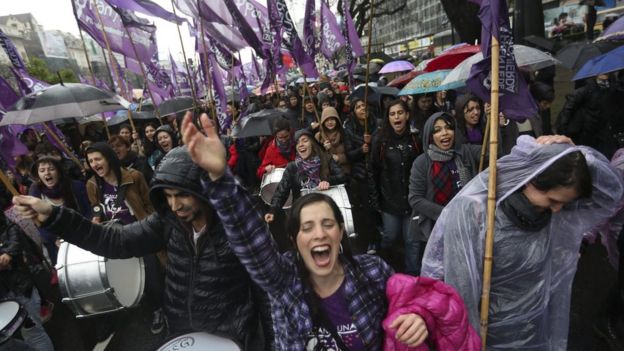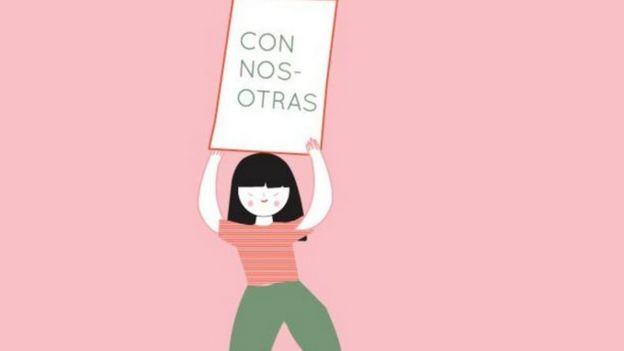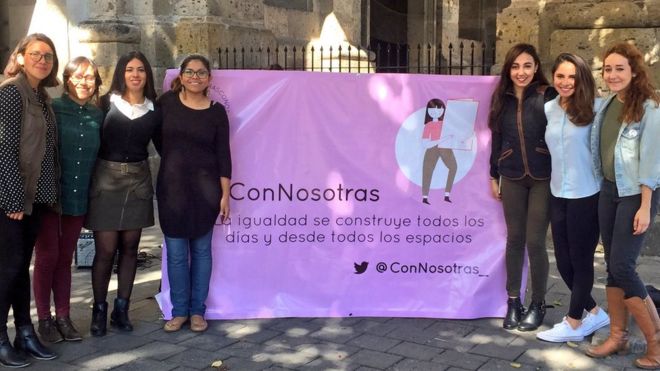A group of young Mexican women has created a manifesto asking men not to take part in panels or conferences where there is not a single female speaker.
Con Nosotras, meaning With Us (women), was launched this week in the country's second-largest city, Guadalajara.
Their one-page declaration [in Spanish] also asks institutions and organisations to commit to making more women's voices heard at events, from public debates to round-table discussions.
"To take into account only a male viewpoint on issues that concern us all, abuses, discriminates and perpetuates inequality," concludes the pledge.
"This is not about setting quotas," said one of the 14 co-founders, Claudia Ramirez, adding it was more about tackling the shortage of voices in areas "that have always been culturally occupied by men".
The group, who are all in their 20s, said they were also motivated to take action in response to Latin America's domestic violence problem.
Earlier this year, the Ni Una Menos campaign ("Not one less", meaning not one more woman lost to male violence) in Argentina gained huge support across the region.
Marches were organised in various cities, as well as a collective one-hour strike in protest at the murder of a teenage girl who was drugged and raped in October.
 EPA
EPA
The Mexican group is not alone. Various other initiatives have been launched in recent years to ensure Latin American women get their voices heard.
In Chile, Hay Mujeres ("There are women") has created a directory of female experts and also offers media training to women.
And pan-Latin American network, Red De Politologas works to make the work of female political scientists more visible across the region.
Congrats, you have an all-male panel!
In other parts of the world, Finnish feminist group Hattu has been crowdsourcing examples of all-male panel events since March 2015 on allmalepanels.tumblr.com.
The site has received over 1,700 submissions to date, including one for a Canadian debate about wage inequality that failed to include any women.
"Congrats, you have an all-male panel," they write above each entry.
"The submissions come from all over and from different fields, so it's hard to know exactly where and how things have got better," said Hattu's Saara Sarma.
"But I have received a lot of personal comments from men who no longer will go on all-male panels, or from organisers that they now pay more attention."
Women Also Know Stuff
Over in the US, it was a sense of frustration that men were more commonly called upon to comment on elections, at events and in the press, that sparked the launch of the Women Also Know Stuff database in February.
Women Also Know Stuff is an open-access directory of female experts in various fields, including current hot topics: foreign policy, nuclear weapons, terrorism and immigration.
"With current political events, it is as important as ever that women's expert voices be included," said Emily Beaulieu, a member of the organisation's editorial board and an associate professor in comparative politics at the University of Kentucky.
 CON NOSOTRAS
CON NOSOTRAS
In Mexico, Con Nosotras is arranging public readings of the manifesto while pushing it out on social media under the hashtag #ConNosotras.
They say the initial response has already been encouraging, with lots of men, including some in influential positions, pledging support.
Alex Hermosillo, an activist and politician, wrote on Twitter: "I commit to Con Nosotras to highlight the lack of spaces for women at decision-making tables and to help generate them."
Gabriela De La Torre, Con Nosotras co-founder, said, "The least they [men] can do is use their privileged position to denounce and highlight occasions when they are part of an all-male panel."

No comments:
Post a Comment